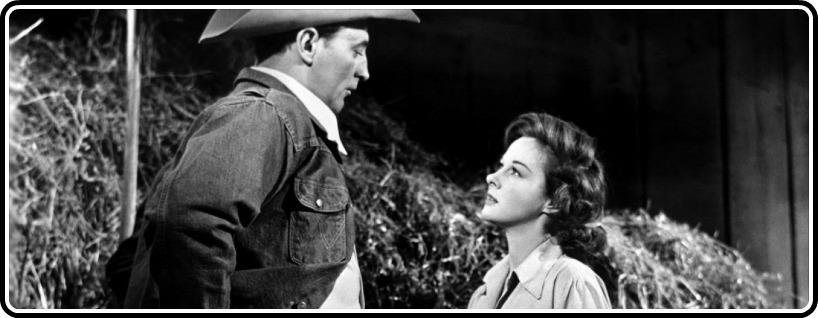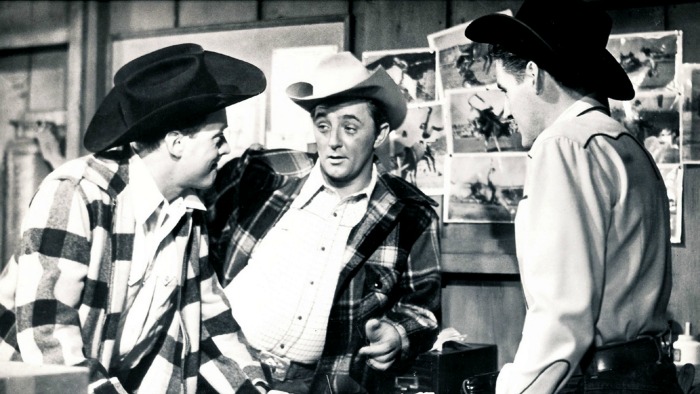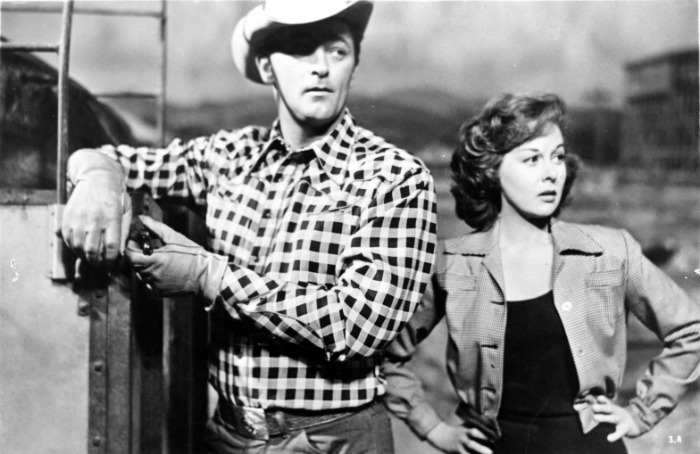
Very few themes, this generation, have been more topic and more hotly discussed cinematically than the idea of fame and its power to corrupt even the purest of hearts and souls. In a world where reality television and social networking make everyone’s lives feel like the most important things in their universe, fame is an idea that has become ingrained in our world, stuck directly to its DNA like a egomaniacal parasite, tearing at every shred of humanism any one person may or may not have.
However, it’s not entirely a generational ideal.
Throughout the history of film, the idea of greed, something very much related to any discussion of fame, has been one of cinema’s great themes. And then there’s a film like Nicholas Ray’s unsung masterpiece, the Western drama The Lusty Men.
As one can take the from the title, the film isn’t your normal Western picture. A far cry from the classical Western style and tropes, Ray’s film isn’t interested so much in the battle between classical ways and modernism’s expansion upon them, instead this one takes a decidedly modern turn.
Ray’s film introduces us an aging rodeo rider named Jeff McCloud (in an underrated, and brilliant, turn from Robert Mitchum) as he takes what appears to be his last ride on a Brahma bull. Injured and down on his luck, he saunters over to his childhood home hoping to find something he left under the building years before. Meeting the new owner, Jeremiah, he sits and drinks coffee with the man until a couple, prospective buyers of the home, arrive for a tour. Trying to save up for the ranch of their dreams, husband Wes and wife Louise (Arthur Kennedy and Susan Hayward respectively), they help the once great rider Jeff get in touch with Wes’ boss back at a local ranch. However, when Wes sees Jeff, and the two start a partnership, they head to the rodeo circuit to make Wes and Louise’s dream (or as we discover, dreams) come true.
At first glance, it’s not Ray’s naturally kinetic camerawork that catches the viewer’s eye, instead the film’s central theme. From the opening sequence of a parade announcing the start of a new rodeo in town, we are thrust into a world where these men are made to be like heroes returning from battle. Given king-like treatment in the streets of the town, these rodeo riders appear to be this world’s superheroes. Toss in the huge sums of cash won for having worked less time than one waits in line at a Starbucks, and the life of a rodeo rider is dangerous, but one full of fame, booze, ladies and money. And it is this sense of life-changing fame and fortune that is the basis for the film’s central theme.

As the film progresses, we see the effect that this fame and its spoils can have on a human being. Perfectly fine with a quiet living on a humble ranch with his beautiful wife, Wes Merritt is shown the power of the rodeo rider’s lifestyle, and falls victim to all of its subsequent vices. Neglecting his wife and lacking the foresight to leave the circuit when the couple reach the goal of being able to afford their dream home, Wes is one of the great and definitive examples of a character being corrupted by, and in many ways (both literally and figuratively) becoming drunk with, the power of fame. One could argue that Jeff McCloud, as a character, starts off attempting to find a way to cling to his past fame (he does jump on as 50/50 partner with Wes), but given the film’s slobbernocker of a final shot, that feels a bit false. Instead Jeff’s main arch involves his relationship with Wes’ wife Louise, and marks some of the more interesting moments within the picture, itself an interesting look at obsession.
It also helps that the performances here are absolutely breathtaking. Mitchum steals the show as Jeff, a performance that shows every side of the great and legendary actor. His voice itself hints at the depth of his talents, being at times stern and frightening, and then the very next moment being warm, inviting and oddly seductive and witty. His character itself is deeply intriguing, a character type we’ve seen before and will see again, but never quite like this. With a tour-de-force final scene really driving home the film’s main thematic and dramatic ideas, it also shows the power that Mitchum had in building the character and our uncanny connection to his journey. Opposite him is Hayward as Louise, and may be the most exciting part of the entire picture. A Brooklyn born actress, there’s a distinct sense of energy and vitality to her performance here, a raw realism and unflinching willingness to go toe to toe with Mitchum, that really adds a great deal of depth to the film. Toss in Arthur Kennedy as Wes, a performance that almost veers into the world of scenery chewing but ultimately saved by the aforementioned final act, and you have a trio of performances that make this film the classic Western that it should truly be known as.

Oh, and did I mention Nicholas Ray is the director? Because it’s hard not to notice that very fact once you see the film. Ray, an enigmatic director, is best known for films like Rebel Without A Cause, and while this picture lacks that film’s whirlwind of style, there’s a lot to dig into here. The black and white photography is absolutely superb, and Ray’s camera employs various styles to get across different emotions and moments. From the handheld shots atop a bull or the unforgettable shot, from floor level, of a smaller character here drinking while at a party, to the use of near-documentary style filmmaking during a few of the rodeo sequences, and you have a film that is as experimental a Western as you’ll likely ever see. The performances take control here in many ways, particularly when we see Hayward and Mitchum duke it out, but Ray’s hands are all over this film, turning it into an unforgettable bit of Western mythology, showing the darkside of fame.
And here’s the catch. The film’s relatively impossible to find on home video. In a brief search for the film, it appears as though the film isn’t available to be purchased. And this is my call for that to change. A new transfer for the film could be much needed (although whatever print was shown this past weekend on TCM would be mighty fine), and a commentary here with any of Criterion’s Western scholar staples would be more than welcome. A piece looking into Ray’s career would be fantastic, and there are a handful of things one could point out here. From the history of rodeo to the film’s great score, there are a handful of talking points here, and could really make for a deep home video release. Featuring powerful performances, this devastating Western has been out of the public’s spotlight for too long. Ray’s masterpiece deserves better.



![Bergman Island (The Criterion Collection) [Blu-ray]](https://criterioncast.com/wp-content/uploads/2022/11/bergman-island-the-criterion-collection-blu-ray-400x496.jpg)
![This Is Not a Burial, It’s a Resurrection (The Criterion Collection) [Blu-ray]](https://criterioncast.com/wp-content/uploads/2022/11/this-is-not-a-burial-its-a-resurrection-the-criterion-collection-blu-ray-400x496.jpg)
![Lars von Trier's Europe Trilogy (The Criterion Collection) [The Element of Crime/Epidemic/Europa] [Blu-ray]](https://criterioncast.com/wp-content/uploads/2022/11/lars-von-triers-europe-trilogy-the-criterion-collection-the-element-of-400x496.jpg)
![Imitation of Life (The Criterion Collection) [Blu-ray]](https://criterioncast.com/wp-content/uploads/2022/11/imitation-of-life-the-criterion-collection-blu-ray-400x496.jpg)
![The Adventures of Baron Munchausen (The Criterion Collection) [4K UHD]](https://criterioncast.com/wp-content/uploads/2022/11/the-adventures-of-baron-munchausen-the-criterion-collection-4k-uhd-400x496.jpg)
![Cooley High [Criterion Collection] [Blu-ray] [1975]](https://criterioncast.com/wp-content/uploads/2022/11/cooley-high-criterion-collection-blu-ray-1975-400x496.jpg)